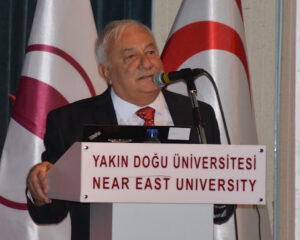The 40th ANKEM Congress, held from May 8 to 11, 2025, at the Atatürk Culture and Congress Center on the Near East University campus, marked a major scientific gathering of academics, clinicians, researchers, and healthcare professionals from Türkiye, Northern Cyprus, and beyond. Jointly organized by Near East University and the Antibiotic and Chemotherapy Association (ANKEM), the congress featured an ambitious four-day program focusing on rational antibiotic use, infection control, vaccination practices, antimicrobial resistance, and the transformative role of artificial intelligence in healthcare.
With the slogan “Vaccinate for health, use antibiotics rationally,” the congress brought attention to global and local challenges in infectious disease management while presenting forward-looking strategies rooted in evidence-based medicine and interdisciplinary collaboration. Over the course of the congress, 69 experts contributed as speakers or moderators in 7 keynote conferences, 8 mini panels, 5 major panels, and 1 satellite symposium, creating a dynamic scientific atmosphere for academic exchange.
Institutional Commitment and Scientific Leadership
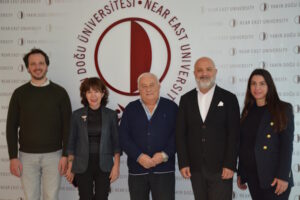
The congress was co-chaired by Prof. Dr. Sebahat Aksaray (University of Health Sciences) and Assoc. Prof. Dr. Buket Baddal (Faculty of Medicine, Near East University & DESAM Research Institute). General secretaries included Prof. Dr. Dolunay Gülmez (Hacettepe University) and Prof. Dr. Emrah Ruh (Near East University).
In his opening speech, Near East University Rector Prof. Dr. Tamer Şanlıdağ emphasized the institution’s strategic role not only as a host but also as a research-intensive solution partner in the global fight against antimicrobial resistance. He noted the cutting-edge bacteriophage research conducted on campus and the design of new antimicrobial compounds, which are being tested both in vitro and in vivo with AI-integrated platforms.
“Antibiotics remain one of the greatest discoveries in modern medicine,” said Prof. Dr. Şanlıdağ. “But we must acknowledge the threat of overuse and work collaboratively—across disciplines and borders—to develop new tools and policies. At Near East University, we are committed to that mission.”
From Epidemics to Algorithms: A Rich Multidisciplinary Program
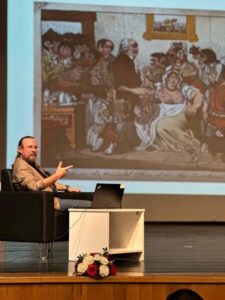
The congress opened with “ANKEM Square,” an interdisciplinary session exploring the cultural impact of epidemics under the title “Epidemics and Art,” emphasizing how public health crises intersect with social and artistic expression. The session set the tone for a congress that would balance clinical depth with broader societal reflection. The keynote address was delivered by Prof. Erdoğan Ergün, Vice Dean of the Faculty of Fine Arts and Design at Near East University, who examined the evolving role of art during times of social crisis. The session was moderated by Prof. Dr. Emrah Ruh from the NEU Faculty of Medicine, contributing a valuable perspective on the interplay between medicine, culture, and human experience.
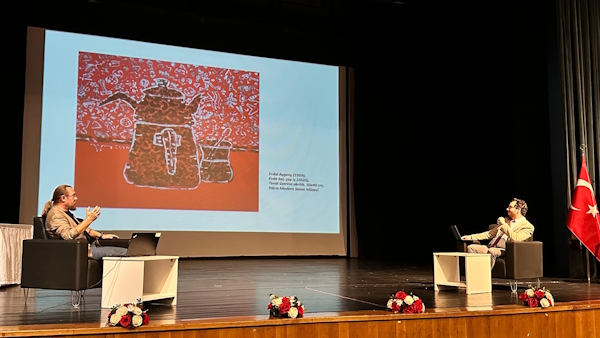
On the same day, the prestigious Enver Tali Çetin Conference, titled “Innovative Approaches in the Field of Health,” was delivered by Prof. Dr. Tamer Şanlıdağ, Rector of Near East University. In his presentation, he spotlighted digital health technologies, biotechnological advances, and AI-supported diagnostic systems, offering a critical look at how technology is reshaping both the accessibility and quality of healthcare services. His insights reflected the university’s ongoing efforts to integrate cutting-edge research into clinical and public health practice.
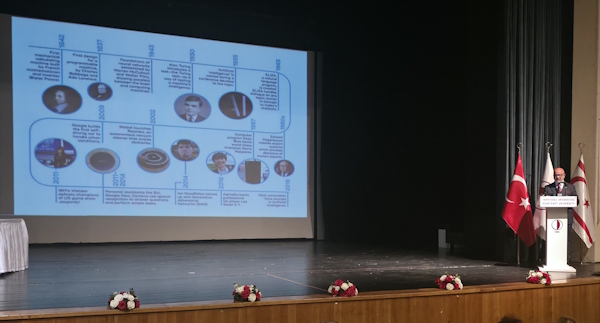
Artificial intelligence remained central throughout the first day, especially in the well-attended panel “Artificial Intelligence, Fuzzy Logic and Mathematical Modeling in Healthcare,” which tackled diagnostic accuracy, outbreak prediction, and the use of multi-criteria decision-making methods in clinical pathways. Discussions around outbreak monitoring and risk management underscored how computational tools are increasingly integrated into national and institutional response systems.
Infection Control, Vaccination, and Antimicrobial Resistance
The second day of the congress shifted the focus to clinical challenges in infection management. Sessions opened with the evaluation of urinary system infections in children, followed by a keynote on the principles of rational antibiotic use, which framed much of the day’s discussion.
Panels that followed offered in-depth analyses of bacterial and fungal threats in intensive care units, perioperative infection control, and surgical prophylaxis, revealing gaps between current guidelines and clinical practice. The satellite symposium titled “Race Against Time: When Should We Use Syndromic Tests?” examined the clinical decision-making processes in urgent care settings, particularly in sepsis and febrile illnesses.
Later sessions explored the current state of pediatric and adult vaccination, including the introduction of new vaccines and updated strategies for high-risk groups such as pregnant women, immunocompromised patients, and healthcare workers. A closing panel on sexually transmitted infections, featuring discussions on HIV, HPV, and syphilis, highlighted ongoing challenges in prevention, diagnosis, and community-based interventions.
A particularly thought-provoking keynote, “The Transformative Effects of Biotechnological Developments in Infectious Disease Management,” addressed the integration of biopharmaceuticals and advanced diagnostics into routine clinical workflows, with specific focus on cancer and transplant patients.
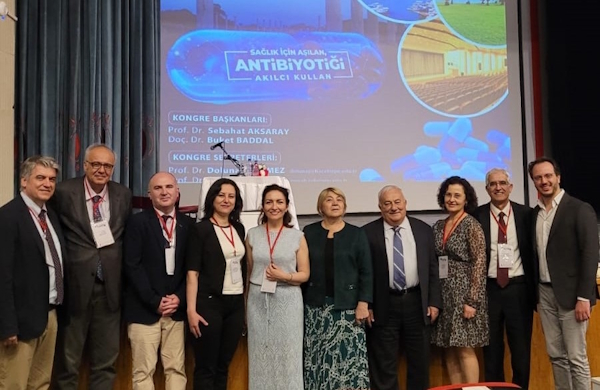
Day Three: Food Safety, Resistance, and Neonatal Infections
On Day Three, attention turned to hospital-acquired infections and foodborne risks. Sessions began with a discussion on ectoparasitic infections, followed by a conference on biological agents and infection risk management. The panel “Management of Hospital Infection Outbreaks” delved into topics such as molecular resistance mechanisms, the role of microbiology laboratories in outbreak prevention, and real-world cases of resistant bacteria outbreaks, offering practical insights backed by epidemiological data.
A keynote on foodborne infections emphasized the intersection between microbiology, public health, and food safety. Subsequent sessions covered fever management in pediatric patients, and sepsis and meningitis in neonates, underscoring the need for early diagnosis and guideline-based therapy in vulnerable populations.
In the closing session of the day, researchers examined the growing issue of antiprotozoal drug resistance and discussed complementary and alternative antimicrobial therapies, signaling the necessity of expanding the clinical toolkit in the face of rising resistance.
Day Four: From Research to Publication
The final day of the congress was devoted to the scientific publication process, offering practical guidance to early-career researchers and seasoned academics alike. The session “Interactive Meeting: How to Publish an Article?” was followed by panels on scientific research planning, research ethics, academic writing, and predatory publishing practices. These sessions served as a bridge between the scientific production and dissemination processes, underscoring the importance of methodological rigor and ethical standards.
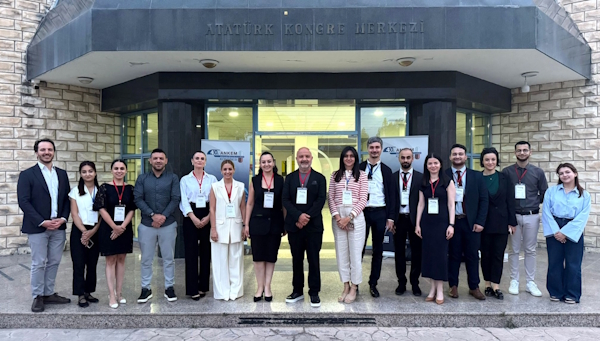
Research Excellence Recognized at the 40th ANKEM Congress
At the 40th ANKEM Congress outstanding research contributions were recognized through poster and oral presentation awards. Among numerous high-quality submissions, Near East University researchers received remarkable recognition for their innovative work in microbiology, infectious diseases, and molecular biology.
Poster Presentation Awards
First Place: “Evaluation of Antibacterial Effects of New Isatin-Based Mannich Derivatives” by Emine Erdağ, Doruk Kaynarca, Nazife Sultanoğlu, Tamer Şanlıdağ
Second Place: “Automatic Detection of Blastocystis hominis in Stool Samples Using Microscopic Imaging and Machine Learning” by Cemile Bağkur, Al Hueein Basil Yaseen Alhllawi, Cenk Serhan Özverrel, Fadi Al-Turjman, Kaya Süer
Third Place: “Analysis of Junctional Complex JAM-A Changes in Intestinal Epithelium After Hypoxia and Inflammation” by Yağmur Yolcu, Hilal Kabadayı Ensarioğlu, H. Seda Vatansever
Oral Presentation Awards
First Prize: “Recombinant Mycobacterium bovis BCG-Based SARS-CoV-2 Antigen Expression and Vector Vaccine Development Studies” by Behiç Koyutürk, Rainer Kalscheuer, Lasse Van
Celebrating 40 Years of ANKEM
Marking the association’s four-decade journey, ANKEM President Prof. Dr. Bülent Gürler celebrated the association’s legacy in supporting clinical practice with scientific evidence. Addressing young researchers, he added: “The future of ANKEM lies in your hands. Continue this journey with new questions, new methods, and a commitment to global health.”
Co-chair Prof. Dr. Sebahat Aksaray concluded by emphasizing ANKEM’s unique position in uniting multiple fields under one scientific roof: “This congress is proof that collaborative, cross-disciplinary approaches are not only possible but essential in confronting today’s complex health challenges.”
